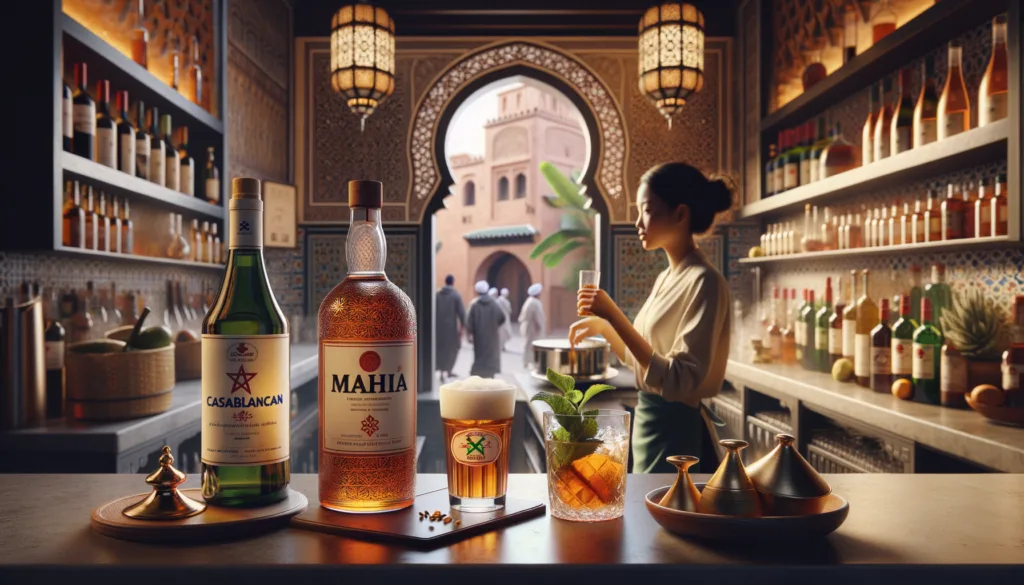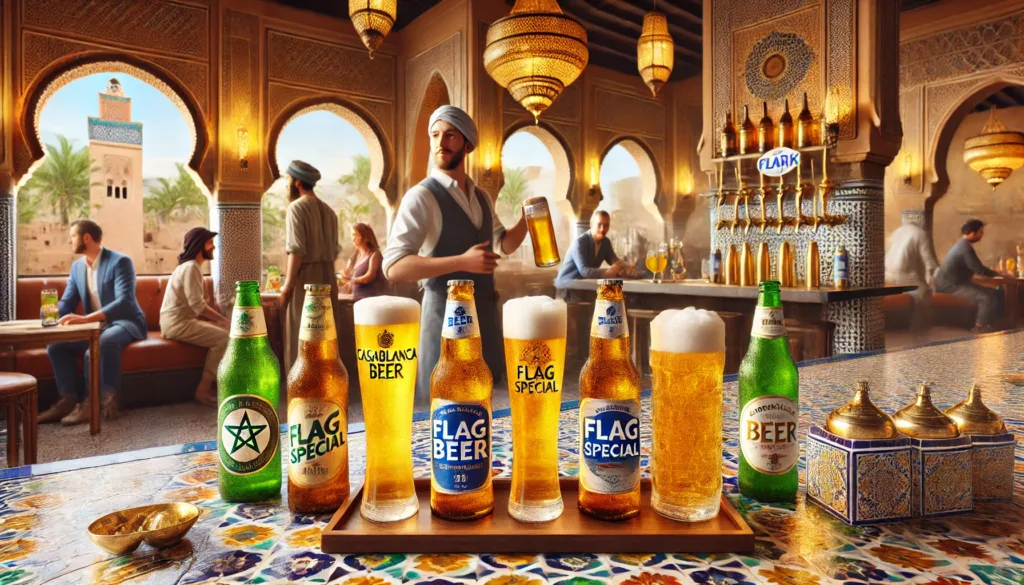
Morocco, a land of vibrant culture, stunning landscapes, and rich culinary traditions, offers a surprisingly diverse alcoholic beverage scene. While the country is predominantly Muslim, and alcohol consumption is often associated with tourism and ex-pat communities, Morocco has a deep-rooted connection to winemaking, a small but growing beer industry, and a unique traditional spirit known as Mahia.
Throughout history, Morocco’s alcoholic beverages have evolved under a blend of Berber, Arab, French, and Jewish influences. Today, visitors can explore local wines crafted in age-old vineyards, sip refreshing Moroccan beers, or indulge in exotic cocktails infused with native ingredients. However, drinking in Morocco also comes with cultural and legal considerations—alcohol is regulated, and public consumption is generally discreet.
In this article, we will journey through Morocco’s spirited landscape, from time-honored drinks like Mahia to modern Moroccan-inspired cocktails, while also shedding light on the country’s fascinating wine and beer traditions.
Traditional Moroccan Spirits – The Legacy of Mahia
What is Mahia?
Mahia is Morocco’s traditional distilled spirit, a strong yet aromatic liquor that has been an integral part of Moroccan Jewish heritage for centuries. Typically made from fermented figs or dates and infused with anise, this unique drink embodies a rich historical legacy and a smooth, warming taste.
The Historical Roots of Mahia
The origins of Mahia can be traced back to Morocco’s Jewish communities, who perfected the distillation process generations ago. Historically, Jewish distillers in Morocco were known for crafting high-quality spirits, and Mahia became a treasured drink both within the community and beyond. Even after Moroccan Jews migrated to other parts of the world, they carried the tradition with them, keeping the legacy of Mahia alive.
Ingredients and Production
The heart of Mahia lies in its simple yet refined ingredients. Traditional production involves fermenting ripe figs or dates, which are then carefully distilled to extract a smooth, high-proof alcohol base. Anise seeds are added, giving Mahia its signature licorice-like aroma and slightly herbal taste.
Distillation Process:
- Harvesting and fermenting ripe figs or dates.
- Slow distillation to produce high-proof alcohol.
- Infusion with anise and other aromatic spices.
- Aging (optional) to allow flavors to mature.
How Mahia is Enjoyed
Mahia is traditionally consumed in small quantities, often as a digestif after meals. Its strong yet smooth profile makes it ideal for sipping neat, but modern interpretations have led to its use in contemporary cocktails. Bartenders worldwide craft Mahia-based drinks, blending the spirit with citrus, herbs, and other traditional Moroccan ingredients like rose water or orange blossom.
Popular Ways to Enjoy Mahia:
- Neat: Served in small glasses as a post-dinner digestif.
- On the Rocks: Chilled over ice for a refreshing twist.
- In Cocktails: Mixed with citrus and aromatic spices to create signature Moroccan-inspired drinks.
While Mahia remains a hidden gem in the global spirits market, it continues to hold a special place in Moroccan tradition. Whether enjoyed on its own or expertly mixed into a cocktail, it offers a taste of Morocco’s rich, multicultural heritage.
Moroccan Winemaking Tradition
Brief History of Moroccan Wine Production
Morocco’s winemaking tradition dates back to the Phoenicians and Romans, who cultivated vineyards in North Africa thousands of years ago. However, the modern wine industry was significantly shaped by French influence during the colonial period. Today, despite Morocco being a predominantly Muslim country, winemaking continues within legal restrictions, producing wines that have garnered international recognition.
Key Wine Regions in Morocco
Morocco boasts several wine-producing regions, primarily located in the northern and central parts of the country, where the climate and soil conditions are favorable. Some of the most notable regions include:
- Meknès: Often referred to as the heart of Moroccan wine production, Meknès benefits from altitude and a Mediterranean climate.
- Beni M’Tir: A lesser-known but high-quality wine-producing area.
- Zenata: Located near Casablanca, historically significant in Moroccan winemaking.
Notable Moroccan Wine Varieties
Red Wines
Morocco is known for robust, earthy reds that pair well with the country’s flavorful cuisine. Key varieties include:
- Carignan: A bold grape with spicy and dark fruit aromas.
- Cinsault: Light-bodied and fruity, often used in blends.
- Alicante: Dark, rich, and full-flavored, with a distinctive touch of spice.
White Wines
White wines in Morocco tend to be aromatic and refreshing, well-suited for the country’s warm climate. Some of the most common varieties include:
- Clairette Blanche: A delicate and floral wine, often dry.
- Muscat: Frequently used for sweeter wines, offering floral and citrus notes.
Gris (Gray) Wines – A Moroccan Specialty
One of Morocco’s most unique wine styles is gris, or “gray wine.” While technically classified as a rosé, gris wines are made from red grapes but have a much paler hue. They are light, crisp, and refreshing, perfect for warm climates and Mediterranean cuisine.
The Rise of Moroccan Beer

Morocco’s Local Beer Industry
Although Morocco is not as famous for beer as it is for wine, the country has a growing beer industry that caters primarily to tourists and expatriates. Several local breweries produce a variety of beers, ranging from light lagers to more full-bodied options. While import restrictions limit the availability of some international brands, Moroccan beers have carved out their own niche in the market.
Popular Moroccan Beer Brands
Casablanca Beer
Perhaps the most recognizable Moroccan beer, Casablanca Beer is a premium lager known for its smooth, refreshing taste. It is widely available in Morocco’s major cities and serves as a great accompaniment to local cuisine.
Flag Special
Flag Special is one of the most popular beers in Morocco, offering a slightly full-bodied experience compared to other local lagers. It has a mild bitterness and a crisp finish, making it a popular choice among locals and visitors alike.
Stork
A lighter beer designed for Morocco’s warm climate, Stork is a more casual, easy-drinking option. It is often consumed in social settings and pairs well with light appetizers and grilled foods.
While craft beer culture remains relatively limited in Morocco, some small-scale breweries have started experimenting with new flavors and styles in recent years. Beer remains heavily regulated, but in Morocco’s larger cities, visitors can find both local and imported brews at licensed venues.
Alcohol Regulations and Availability in Morocco
Legal Framework and Restrictions
While Morocco is predominantly a Muslim country, alcohol consumption is legal and regulated. However, certain laws govern its purchase and consumption:
Legal Drinking Age
The official drinking age in Morocco is 18 years old. However, enforcement of this rule can vary, especially in more touristy areas.
Where to Buy Alcohol
Alcohol is not widely available in everyday commercial outlets but can be found in licensed establishments, including:
- Hotels with bars and restaurants catering to international visitors.
- Designated liquor stores in major cities like Casablanca, Marrakech, and Rabat.
- Supermarkets such as Carrefour and Marjane, which have separate alcohol sections.
Tourists should note that alcohol sales may be restricted on specific religious holidays.
Seasonal and Religious Considerations
During the holy month of Ramadan, alcohol sales may be restricted, and many bars and restaurants either reduce their hours or stop serving alcohol altogether. However, some international hotels and select venues still cater to foreign visitors.
Social Etiquette and Public Perception
Despite its availability, alcohol consumption carries certain social taboos:
- Public intoxication is strongly discouraged and can attract negative attention.
- Many Moroccans, especially within conservative communities, abstain from alcohol entirely due to religious reasons.
- Drinking culture is more common in cosmopolitan cities, while rural areas have stricter social norms.
Visitors are encouraged to enjoy Morocco’s alcoholic offerings discreetly and respectfully, keeping local sensibilities in mind.
Conclusion
Morocco’s alcoholic beverage landscape is as diverse as its cultural heritage, offering everything from traditional spirits like Mahia to a blossoming winemaking industry and locally brewed beers. Whether sipping a glass of Moroccan wine with a meal or enjoying a craft cocktail infused with local flavors, there’s something for everyone.
However, travelers should be mindful of the country’s legal and social nuances regarding alcohol. Drinking responsibly and showing cultural sensitivity will ensure a more enriching experience while exploring Morocco’s spirited side.
For those who prefer non-alcoholic alternatives, Morocco offers an equally vibrant selection of beverages. A glass of refreshing mint tea, often called “Berber whiskey,” remains a timeless and cherished part of Moroccan hospitality.
Frequently Asked Questions (FAQ) About Alcohol in Morocco
Is alcohol legal in Morocco?
Yes, alcohol is legally produced and consumed in Morocco. However, there are regulations, and it is primarily available in licensed establishments such as hotels, bars, and select restaurants, especially in urban areas and tourist destinations.
What is Mahia?
Mahia is Morocco’s traditional alcoholic spirit, distilled primarily from dates or figs. It has a clear appearance and an anise-flavored profile. Historically, it was produced by Moroccan Jews and is often enjoyed as a digestif or used as the base for cocktails.
What types of wine are produced in Morocco?
Morocco has a rich winemaking tradition, producing red, white, and gris (gray) wines. Red wines often include Carignan, Cinsault, and Alicante grapes, while white wines are typically made from Clairette blanche and Muscat grapes. Gris wine is a local specialty made from red grapes with minimal skin contact.
Are there Moroccan beers?
Yes, Morocco produces several beers, with popular brands including Casablanca Beer, Flag Special, and Stork. Casablanca Beer is the most iconic, while Flag Special has a deeper flavor profile, and Stork is a lighter option ideal for warm weather.
Where can I buy alcohol in Morocco?
Alcohol is available in licensed bars, hotels, specialized liquor stores, and some supermarkets. However, availability may vary by region, with urban areas and tourist destinations offering more options.
What is the legal drinking age in Morocco?
The legal drinking age in Morocco is 18.
How does Ramadan affect alcohol sales in Morocco?
During Ramadan, alcohol sales may be more restricted, particularly in public spaces. Some bars and stores choose to suspend sales entirely during this period, so availability can be limited.
What are some Moroccan-inspired cocktails?
Some Moroccan-inspired cocktails include:
- Moroccan Mojito: A twist on the classic mojito, incorporating ingredients like cardamom, orange-flavored liqueur, and rose water.
- Moroccotini: A cocktail featuring orange-flavored vodka, lime juice, sugar syrup, and mint, reflecting Morocco’s vibrant flavors.
Is drinking alcohol common in Morocco?
While alcohol is available, many Moroccans do not consume it due to religious and cultural reasons. Public intoxication is frowned upon, so it’s important to be respectful of local customs.
What are some non-alcoholic alternatives in Morocco?
Morocco is famous for its mint tea, often referred to as “Berber whiskey.” Other non-alcoholic beverages include fresh fruit juices and almond-based drinks.